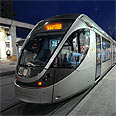
Jerusalem tram going nowhere
Streetcar named disaster: Ambitious $1.2 billion project meant to shunt ancient city into 21st century hits one red light after another
Test running since 2010, the light rail's empty trams, seats covered in nylon sheets, glide elegantly past Jerusalem's Old City walls. "Next stop Damascus Gate" the loudspeakers call out in Hebrew, Arabic and English to no one.
Numerous delays have plagued the project since Israel began building its first light rail system in 2002. Officials said last week they expected the long awaited inauguration set for August to be put off, yet again, by weeks, if not months.
The Jerusalem municipality first decided to build a light rail in 1995 with the aim of running it by 2006. Israeli media have reported safety and security issues will not allow the light rail to take on passengers before November 2011.
The latest bump in the road was a dispute over which engineer would be qualified to sign off on the safety of the traffic lights at road intersections.
Given the city's history of suicide bus bombings, misgivings about the light rail's security have also been brewing, as are threats to call a strike over tram drivers' employment terms.
wa.jpg)
'They made the whole city ugly.' Jaffa Street (Photo: Guy Assayag)
The patience of Jerusalemites is wearing thin.
"The entire city center, market and residents have all been crushed for the sake of this wretched project," said Yitzhak Haim, a vegetable vendor at the central Mahane Yehuda market, which has been badly disrupted by years of construction work.
"They said 2006, then it was put off to 2008, then 2009. Now it's 2011, I'm not sure it will be running in 2012," he added.
Shmulik Azo, owner of a watermelon stand, was also unforgiving about the light railway line that city officials say will eventually carry half a million people a day, boosting tourism and commerce.
"They made the whole city ugly, stifled businesses and the market all for this train," he said.
Slow train coming
In 2005 Citypass, a consortium of companies that includes Alstom Israel, subsidiary of French Alstom and Veolia Israel, subsidiary of French firm Veolia, won a concession to build and operate the first light rail line.
When failing to meet a 2008 deadline, arbitration with the government began.
Jerusalem Mayor Nir Barkat threatened to pull the plug on the entire project after his 2008 election. "The whole way this was managed was extremely poor, there was no accountability," Barkat told journalists at a briefing in City Hall.
In the interest of getting the train running, mutual claims between government and private firms were best mediated outside the court, Barkat said. A Citypass spokesman declined comment.
Veolia and Alstom have been pressured by pro-Palestinian groups to pull out of the project which links the western part of the city to the eastern side that was annexed by Israel after the 1967 war – a move not recognized internationally.
The Palestinians want east Jerusalem as the capital of a future state. Israel has declared Jerusalem its eternal, undivided capital. The light rail has stops in both Jewish and Palestinian populated areas in east Jerusalem.
Dimitre Deliani, a member of Palestinian President Mahmoud Abbas' Fatah Revolutionary Council, said the French firms were "partners to the crime of settlement expansion".
Alstom and Veolia have made deals to sell their Citypass shares, but both companies stressed it was purely a business move. "Veolia makes its decisions according to financial and business considerations only," an adviser to the company said.
A spokesperson for Alstom said: "A French court ruled the company was in keeping with French and international law ... Alstom's policy is to sell its shares when the ground is ready, it has done so in similar projects in other countries too."
Light at the end of the tunnel
Barkat dismissed the Palestinian protests. "This is an effective way to create a network which enables all residents of Jerusalem, regardless of their religion, to move from any source to any destination," he said.
Other officials said the tracks could present a future opportunity, easily linking east Jerusalem to Ramallah, a major Palestinian city in the occupied West Bank.
Despite the snags and delays, officials remain optimistic about the light rail's future impact on the city, hit by a series of suicide bombings during a 2000-5 Palestinian uprising.
A new mass transit five-year plan for a network of multiple light rail lines, new bus routes, bicycle paths and fast lanes, aims to provide tourists, students and residents quick access to shops, businesses, historical sites, universities and hospitals.
Barkat said he believed the new system would help boost the number of tourists to the city holy to Christians, Muslims and Jews to 10 million a year, from 3.5 million in 2010.
Shmuel Algrabli, strategic adviser to JTMT, said the $1.2 billion project would revolutionize Jerusalem's polluting and antiquated public transport, which he likened to a bowl of spaghetti, bus routes going all over the place with no logic.
"It's been a long, difficult birth, but we are almost there," Algrabli said.
- Follow Ynetnews on Facebook










